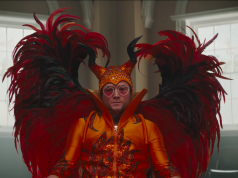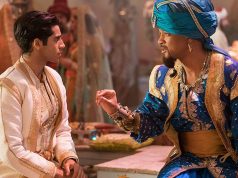For me, the measure of a biopic’s greatness is whether it makes a person I wasn’t particularly interested in before seem interesting. I was apathetic toward Muhammad Ali, and “Ali” didn’t change that. I never gave a thought to Andy Kaufman, but “Man on the Moon” made me think about him a lot. “Ray” belongs to the latter camp. I spent very little time pondering Ray Charles before — great pianist, overcame his blindness, very famous, sorry he died, and so forth — and now here I am appreciating his talents and finding him to be an interesting character.
The star of this film, as you have already heard, is Jamie Foxx. I think his dramatic turn in “Collateral,” in which he did not annoy me — a first for Jamie Foxx — prepared me for “Ray,” where he is shockingly good. He does a fine impersonation of Charles, first of all — the voice, the mannerisms, the piano style — but most film performances that are ONLY impersonations lose their impact when it comes to emotions. It’s one thing to behave like the famous guy everyone has seen on TV; it’s quite another to show us how that person would have acted in private. Foxx has the acting chops to back it up. He puts Charles into believable emotional situations and acts the way we imagine Charles would have acted, translating his public persona into a real character.
The film commences with Ray’s journey in 1948 from his north Florida home to Seattle, where he has a gig lined up as a blues pianist. He meets a fellow outside the club, a trumpet player. They chat a minute. When Ray introduces himself, the man replies, “I’m Quincy Jones.” Lovers of music and musical history titter with excitement.
The movie is like that. We see Ray get his trademark sunglasses, see him drop his surname, Robinson, since there was already a Ray Robinson in the public eye, see him improvise the song that became “What’d I Say.” We see the concert where one of his backup singers, a Ray-spurned lover named Margie (Regina King), growls the words to “Hit the Road, Jack” like she really, really means them. We see him get introduced first to marijuana, then to heroin. We see him record “Georgia on My Mind,” only to be banned from performing in Georgia after he refuses to play for segregated audiences.
Ray was not what you’d call a monogamous man. His marriage to Della Bea (the sublime Kerry Washington), a former gospel singer who at first is appalled at Ray’s mixing gospel tunes with R&B lyrics, is depicted as tumultuous in the way that tortured artists’ marriages are always depicted as tumultuous. There are the standard “you care more about your [music/art/writing/drugs/whatever] than you care about me” accusations, with the requisite “I hate your lifestyle but I sure love how rich we are” moments.
Director Taylor Hackford (“Proof of Life,” “The Devil’s Advocate”), who shares story credit with screenwriter James L. White, knows that music was the key to Ray Charles’ appeal. As a character, he is often selfish and destructive (though he does balance it with sympathetic moments), but as a musician and performer, there is no ambivalence. Hackford is therefore wise to infuse nearly every scene with music — catchy, rhythmic, soulful music — and thus infuse the film entire with energy.
Ultimately, it’s the music that keeps me drawn into the film, followed closely by Jamie Foxx’s soulful (in both senses of the word) performance. The time periods are recreated vividly, the direction is smooth, the film works. Now I think about Ray Charles a lot, too.
B+ (2 hrs., 31 min.; )





